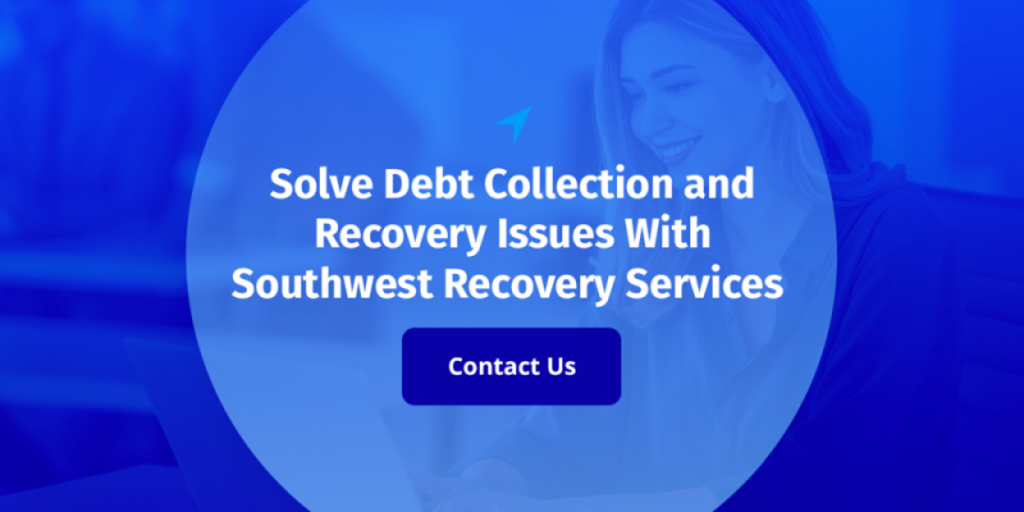- Customer Service 866-837-3065 Make A Payment (866) 558-3328
- Client Portal
- Consumer Support

When your business extends credit terms to customers, you’re providing an interest-free loan. It’s standard practice in B2B transactions, but it carries inherent risks. When those invoices go unpaid, and your internal collection efforts hit a wall, that’s when third-party debt collectors become essential.
A third-party debt collector is an independent organization completely separate from your business. They specialize in recovering outstanding debts for creditors who have exhausted their internal collection resources.
Unlike your accounting team sending reminder emails or your sales staff making uncomfortable phone calls, these agencies bring dedicated expertise, proven strategies, and sophisticated technology designed specifically for debt recovery.
|
Southwest Recovery Services: Get Your Money Back 20+ Years Experience | Texas-Based | Contingency Only – You Pay When We Collect
Built for Commercial Collections:
The Southwest Recovery Difference: ✓ Contingency only – no upfront costs ✓ Veteran collectors with respectful omnichannel outreach ✓ Priority sectors: trucking, logistics, contractors, oil & gas ✓ Clear reporting on account status and outcomes Trust & Results You Need: Nationally recognized ethical collections agency with 12 offices across six states. Compliance-first approach with no threats or guarantees. |
When & Why Businesses Hire Third-Party Debt Collectors

Most businesses turn to third-party collectors after 90–120 days of non-payment. By this point, multiple internal attempts have failed, and the debt has aged considerably. Every day an invoice sits unpaid is another day your working capital is tied up, limiting your ability to invest in growth, pay your own suppliers, or cover operational expenses.
Several scenarios make engaging a third-party collector the right move:
The decision to hire a third-party collector isn’t an admission of defeat; it’s strategic business management. Professional agencies understand debtor psychology, know which communication methods work best, and have systems in place to maintain persistent contact without crossing legal boundaries.
The process begins when you assign the debt to the collection agency. You maintain ownership of the debt, so the agency is working on your behalf, not buying the debt from you.
You’ll provide all relevant documentation: contracts, invoices, delivery receipts, correspondence history, and any previous payment agreements. The agency reviews this information to understand the debt’s history, identify potential disputes, and develop a collection strategy for your specific situation.
Once assigned, the agency initiates contact with your debtor through multiple channels, including phone, email, postal mail, and text. This omnichannel approach ensures they reach the debtor regardless of their preferred communication method.
The first communication typically includes a debt validation letter outlining the amount owed, the original creditor, and the debtor’s legal rights. If the debtor disputes the debt, the agency must provide documentation proving the debt’s validity. This validation requirement protects both parties and ensures transparency throughout the process.
Most debts are resolved through negotiation rather than legal action. Professional collectors excel at finding solutions that work for both parties. They might arrange payment plans that fit the debtor’s cash flow situation, negotiate reduced settlements for immediate lump-sum payments, or work through disputes to establish the undisputed balance.
This negotiation phase requires skill and experience. Too aggressive, and you risk permanently destroying the business relationship. Too lenient, and recovery becomes unlikely. Professional agencies strike the right balance, using firm but respectful communication that motivates payment while preserving goodwill.
If negotiation fails and the debtor refuses to pay or becomes unreachable, the agency may recommend legal action. This could involve filing a lawsuit, obtaining a judgment, placing liens on property, or pursuing wage garnishments.
Legal escalation is always a last resort, used only when other methods have been exhausted, and the debt size justifies the expense.

The Fair Debt Collection Practices Act (FDCPA) establishes strict guidelines for how collectors can communicate with consumer debtors, what information they must provide, and what practices are prohibited.
Key compliance requirements include providing clear debt validation, prohibiting harassment or threats, restricting communication times to reasonable hours, respecting requests to cease contact, and maintaining accurate records of all communications. Violations can result in significant penalties, lawsuits, and reputational damage.
Reputable agencies like Southwest Recovery Services exceed these minimum standards, implementing compliance-first approaches that protect both your business and the debtor’s rights. Every communication is documented, every claim is verified, and every action is measured against legal requirements.
Most third-party collection agencies operate on a contingency basis, meaning you pay nothing up front. The agency collects fees only when it successfully recovers your money, typically 10–25% of the amount recovered, depending on the debt’s age, size, and complexity.
This model aligns the agency’s incentives perfectly with yours. They’re motivated to recover as much as possible because their compensation depends on it. You take on zero financial risk. If they don’t collect, you don’t pay. This contingency structure makes professional collection services accessible for businesses of all sizes.

For over 20 years, Southwest Recovery Services has specialized exclusively in commercial debt collection, with deep expertise in the Texas market and the industries that drive it. If you’re in trucking, logistics, construction, oil and gas, or wholesale distribution, we have built our reputation serving businesses like yours.
We combine technology-driven efficiency with relationship-preserving professionalism. Our AI-guided tracking systems monitor every account across all communication channels, ensuring no resolution opportunities slip through the cracks. Our founder’s daily involvement means your accounts receive strategic attention, not just automated processing.
Operating strictly on a contingency basis means zero upfront costs or monthly fees. You pay only when we successfully recover your funds. With 12 offices across six states, we provide geographic coverage for nationwide collections while maintaining personalized service and industry expertise.
We serve commercial businesses with $10 million to $100 million in revenue, understanding the unique challenges mid-market companies face. Our approach prioritizes relationship preservation because today’s delinquent account might be tomorrow’s strong customer once cash flow improves.
Yes, third-party debt collectors can initiate legal proceedings if negotiations fail and the debt remains unpaid. However, lawsuits are used as a last resort after other recovery methods have been exhausted.
Legal action follows all required procedures and only makes sense when the debt size justifies the expense. Reputable agencies like Southwest Recovery Services (SWRS) evaluate each situation carefully before recommending litigation.
Individual debtors are protected by comprehensive consumer protection laws, primarily the Fair Debt Collection Practices Act.
They have the right to receive debt validation documentation, dispute debts they believe are inaccurate, request that collectors cease communication, be free from harassment or threats, and receive communications only during reasonable hours. These protections ensure fair treatment throughout the collection process.
Your reputation depends entirely on choosing the right agency. Professional collectors like SWRS emphasize respectful, compliant communication that preserves business relationships.
By acting as a buffer between you and your customer, third-party collectors actually protect your reputation; you’re not the one making uncomfortable collection calls. The key is partnering with an agency that shares your values and understands the importance of relationship preservation.
Most businesses engage third-party collectors after 90–120 days of non-payment, though some industries move faster. The critical factor is recognizing when internal efforts have stalled. The longer you wait, the lower your recovery rate becomes.
Debts that are 30–90 days old have significantly higher recovery rates than those that are 6 months or more outstanding. Don’t wait until the statute of limitations becomes a concern; act when you recognize your internal efforts aren’t working.
*Note: Recovery rates mentioned are for general reference only and not guaranteed. Actual results vary by account and industry. Contact Southwest Recovery Services for a customized quote.


We make it fast and easy to refer past due and delinquent accounts to our professional recovery agents. You decide the range on what you will accept on each case, and you ONLY pay a percentage of what we actually collect to resolve the case. Ready to get started, or want to learn more? Fill out this form and a dedicate account manager will call you to get started.